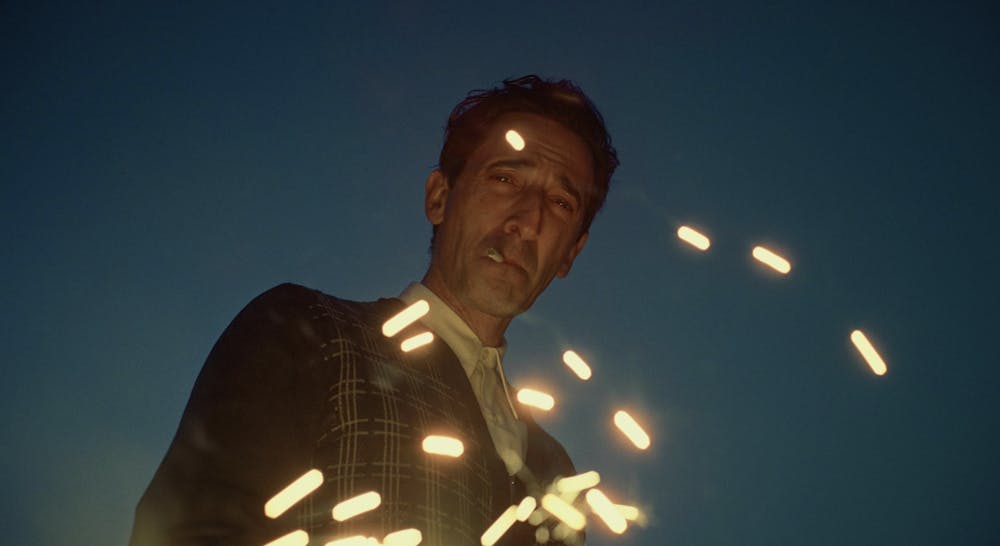In December 2024, director Brady Corbet released “The Brutalist” to great critical praise.
The film follows the fictional story of László Tóth, played by Adrien Brody. László is a talented Jewish Hungarian architect who was forced to flee during World War II. He and his wife are separated, with him making it to the United States while she remains trapped.
In America, László struggles with language, antisemitism, xenophobia and culture shock. His talents are eventually recognized by Harrison Lee Van Buren Sr. (Guy Pearce), a Pennsylvania industrialist who hires László to create a community center in honor of his late mother. The project, however, derails — shattering the fragile illusion of the American dream.
The film has a striking, rich color palette with unapologetically dark shadows contrasting luscious jewel tones.
The film’s poignant themes of falsity, deception and the American dream are brilliantly illustrated through the film’s sound design and cinematic vocabulary.
Our first image of America through László’s eyes is the Statue of Liberty filmed upside-down with a shaky, seemingly handheld camera as it tilts through the frame, showing that the foundational principles of the monument are not as firm as we’d imagine them to be.
One of our final shots is the interior of a chapel built by László, the highlight of which is a window that makes the light at noon form a cross of light on the floor even though the area around it is concrete, claustrophobic and brutalist in its architecture.
Brody gives a heart-wrenching performance as László. He oozes charm and vulnerability, making it very easy to root for him and very hard to watch him struggle, in all of the right ways. Brody’s performance is grounded, but not too stoic or subtle — an excellent but hard-to-strike balance.
As much as I liked the character and story, I could feel every minute of the film’s near three-and-a-half-hour runtime. “The Brutalist” has a major problem with pacing and causality.
Things that happen in one scene don’t seem to matter in the next. László loses a job in one scene, but regains it the next; uses hard drugs in one scene, but is fine the next. The entire first 90-minute act of the film felt like a bunch of different “first scenes” in a row — interesting moments that were ultimately disconnected from each other.
It prevents the film from feeling like it has natural escalation and a satisfying climax.
I’d also be remiss if I didn’t mention the major controversy surrounding “The Brutalist”: the film’s use of artificial intelligence.
Get content from The Daily Lobo delivered to your inbox
In an interview with RedShark, editor Dávid Jancsó revealed that the film used AI to fix Brody and other actors’ Hungarian pronunciation using a program called Respeecher.
You can tell, if you know what you’re looking for. Actors’ mouths don’t move in the right shapes for what they say; the echo and room tone are different between one line in English and another in Hungarian. It takes viewers out of the film and overall cheapens what are otherwise excellent moments.
I find it ironic that the film centers around an obsessive artist with a fixation on beauty, quality and detail who struggles to adapt to, among other things, the American obsession with convenience and speed over authenticity, and still uses AI to cut corners. Corbet and Jancsó said nothing was lost in the performances, but I’m not sure I agree.
In acting, especially in gritty, down-to-earth character dramas, every syllable does matter.
Furthermore, I predict the use of AI will cost Brody the Oscar, which is a shame because he gives an excellent performance. I don’t think the Academy will give him the award for fear of setting a precedent for AI-augmented performances.
Does he really deserve it if part of the performance was learning Hungarian, and he didn’t? All I’ll say is: Back in the good old days, “Best Actor” nominees crawled into bear carcasses for realism in order to win. I suppose we’ll see what happens on film’s biggest night.
Addison Fulton is the culture editor for the Daily Lobo. She can be reached at culture@dailylobo.com or on X @dailylobo






